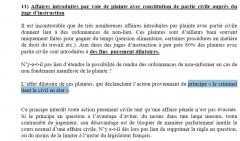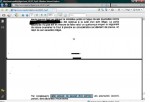11/17/2009
Madoff: CSSF in question
Les Echos yesterday reported that Patrick Littaye, co Access International Advisors, has summoned before courts CSSF and every UBS entities involved with Luxalpha (UBS Luxembourg, UBS Third Party Management, UBS Fund Services, UBS AG).
In his opinion CSSF could not ignore the links between UBS and Madoff.
I am sad for Luxembourg: they were not courageous enough at the begining to admit that they the local functioning opened the drift with Madoff as I demonstrated.
I stated the solution early this year: The only way for investors that are victims of a lax legal and regulatory framework to be respected would be a payment by the Luxembourg State that would go later before the court for the refund in the legal and regulatory framework it enforced.
Should they have compensated the clients, the issue would be over. The reality is that for clients recovering their money lost will be a "long shot" with expenses to pay for the lawyers that anyway will not be included in the surplus of the winding-up.
07:27 Posted in Luxembourg | Permalink | Comments (0)
11/15/2009
How does a judiciary (and regulatory) haven work? The example of Luxembourg
Some foreign readers of this blog may be surprised by my findings about the disclosure of UBS' OPMEM in the media.
I will state three observations about the functioning of Luxembourg as a judiciary and regulatory haven.
1. Filing a criminal complaint and file of a civil action is a common tactic to stop other procedures before courts.
Because of the principle that "criminal law supersedes over civil laws", 80% of criminal complaints are lodged in Luxembourg to delay justice despite the fact that justice delayed is justice denied.
As far as UBS OPMEM is concerned, as it is an internal document, this may be an opportunity to lodge a criminal complaint and file a civil action to stop some investors' procedures.
Cf. annual report 2008, Ministry of Justice, page 134:
Previous annual reports stated the same thing.
2. Luxembourg courts filter evidences
Courts in Luxembourg filter evidences.
To be acceptable the evidence should be legally obtained and not support a value judgement.
2.1. Legal evidences
There are only a few judgements that are published in Luxembourg.
Of which, the following before the Court of Appeal: N°128/07 XD dated 28 February 2007
The debate was about the evidence before courts. The conclusion is that evidence that is obtained in the framework of an illegal action should not be admitted:
It is true as well in France and in many jurisdictions: but in Luxembourg the abuse of the legal and regulatory framework relating to professional secrecy is not in favor of the truth before the courts.
As I said the business community crafts laws and regulations and especially the extent of professional secrecy. "Shape regulation. An up-to-date, innovative legal and fiscal environment is critical to defend and improve Luxembourg's competitive position as a centre for the domiciliation, administration and distribution of investment funds. Strong relationships with regulatory authorities, the government and the legislative body enable ALFI to make an effective contribution to decision-making through relevant input for changes to the regulatory framework, implementation of European directives and regulation of new products or services."(Cf. Alfi brochure "Your bridge between Europe and China: Luxembourg", October 2009). What is true for ALFI is true as well for ABBL.
2.2. Value judgements
The author of a book was cited before the Criminal Court by a Luxembourg lawyer for calumny, libel or, at the least, proffering insults, through the publication of a couple of statements in a footnote of the book.
What was said in the litigious footnote: "[Mr N.S.] was known for his contacts with [M.S.] and [R.C.], former bankers for the Mafia and the Vatican respectively (cf. [F.C.] and [L.S.], op.cit. p. 288), and he was suspected of having forged ties with organised crime, particularly in the United States. He also maintained excellent personal relations with [G.A.], dating from the period when he was president of the European Association of Christian-Democrat Students. As Grand Master of the main Masonic Lodge in Luxembourg, he was responsible for admitting [R.C.] to its ranks."
The author was acquitted with regard to three of these statements, but convicted only of the offence of proffering insults on the ground that he had written that "[N.S.] was suspected of having forged ties with organised crime, particularly in the United States". He was ordered to pay a fine of EUR 1,500 euros and the symbolic amount of one euro to the civil party in respect of damages. The Court of Appeal and the Court of Cassation confirmed: the sentence was considered as a value judgement.
The author went before the CEDH (the "the Court of Human Rights for Europe"): relying on Article 10, he alleged that his conviction for proffering insults had violated his right to freedom of expression. Under Article 6 § 1, he further complained that inadequate reasons had been given in the decisions by the domestic courts with regard to his arguments under Article 10.
Having regard to the modest nature of the sentence imposed and the content of the disputed statements, the CEDH considered that the measures taken against the applicant had not been disproportionate to the legitimate aim pursued. Accordingly, there had not been a violation of Article 10. The CEDH noted that the domestic courts had not explicitly ruled on the applicant's arguments under Article 10 of the Convention. Having examined the reasoning in the decisions by the domestic courts, the CEDH concluded that the applicant did not have grounds for alleging that insufficient reasons had been given for the decisions by the Luxembourg courts, even if, in the applicant's case, more substantial reasoning with regard to Article 10 would have been desirable. Consequently, there had not been a violation of Article 6 § 1.
Dissident opinions of judges found a restrictive conception of the freedom of expression that deny the right to bring evidence (s) when the behaviour of a leader of the jurisdiction is criticised by considering the statement(s) as "value judgement" (Cf. for example Judge Sajô's analysis - CEDH, No 24261/05, BACKES v. LUXEMBOURG, 8 July 2008).
The case was rejected by the Grand Chamber.
3. Criminal liability for legal persons does not exist
The legal framework that is decided by professionals does not organise the criminal lability for legal persons.
As I said, I do not think this is the regulated entities' role to have a very CLOSE AND DIRECT SAY on the evolution of the Luxembourg prudential regulatory environment that is opposable to them, and to exert directly and indirectly LOBBYING initiatives. Such "close and direct say" and "influence" and "direct association "apply not only for the regulator but as well for the parliament (many members of parliament are business lawyers).
The direct consequence is the delay to transpose Recs or regulations despite international commitments.
A very good current example is the difficulty to enforce the criminal liability of legal persons whereas it was possible to change the constitution in a couple of weeks.
18:04 Posted in Luxembourg | Permalink | Comments (0)
11/14/2009
Disclosure of UBS Operating Memorandum about Madoff: UBS' reputation and interest v. Luxembourg's reputation and interest
I have analysed in the previous article that the Operating Memorandum (OPMEM) that quotes Madoff over 20 times should not exonerate a collective responsibility in Luxembourg because of the so-called "relevant input" of professionals in the drawing up of laws and regulations that actually opened and facilitated the drift with Madoff.
I would like to lay emphasis on the consequences that result from the public disclosure in the media of an internal document that was not intended to circulate outside the bank.
UBS is a PSF (Professional of the Financial Sector) that is regulated by CSSF. The PSF statute requires confidentiality i.e. respect of professional secrecy (Cf. article 61-22 of law of 5 April 1993 as amended). Because of the disclosure in the media of an internal document that was not intended to circulate outside the bank, there is a reputational risk for UBS.
If I were UBS I would lodge a criminal complaint and file of a civil action.
The key questions to investigate are:
1. Who circulated the OPMEM outside the bank?
2. Did this person inform UBS he/she had the document outside the bank
3. If yes, when (statute of limitation?)?
Anyway the courts should disregard the OPMEM should an investor want to use it against UBS and even stop the procedure because of the principle "criminal law supersedes over civil laws".
Luxembourg as a jurisdiction, after the episode of prosecutions for the disclosure of internal documents in the framework of the Clearstram affair early 2000s, cannot accept the use of the OPMEM against UBS. Even though it is a seducing opportunity to discharge the collective responsibility in the jurisdiction for the so-called "relevant input" of local professionals in crafting laws and regulations.
A very interesting games theory case study...
09:13 Posted in Luxembourg | Permalink | Comments (0)








